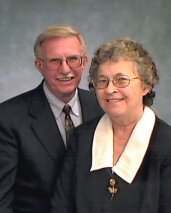
Dr. Harold & Myrna Carpenter
WHY DID HE HAVE TO DIE?
by Dr. Harold R. Carpenter
TEXT: Romans 5:11 Therefore, since we have been justified through faith, we have peace with God through our Lord Jesus Christ,
2 through whom we have gained access by faith into this grace in which we now stand. And we rejoice in the hope of the glory of God.
3 Not only so, but we also rejoice in our sufferings, because we know that suffering produces perseverance;
4 perseverance, character; and character, hope.
5 And hope does not disappoint us, because God has poured out his love into our hearts by the Holy Spirit, whom he has given us.
6 You see, at just the right time, when we were still powerless, Christ died for the ungodly.
7 Very rarely will anyone die for a righteous man, though for a good man someone might possibly dare to die.
8 But God demonstrates his own love for us in this: While we were still sinners, Christ died for us (Romans 5:1-8).
INTRODUCTION:
The pastor came upon a man moaning in agony. With sobbing and tears he cried, "Why, oh why did he have to die? Why did he have to die?
The pastor placed his arm around the shoulders of the sobbing man to comfort him and asked, "But, who is it that died?"
Controlling his weeping for a moment, the man replied, "My wife's first husband."
Some years ago missionary, Paul Finkenbinder, produced a film on the crucifixion and resurrection of Jesus. One of the most dramatic scenes in the movie is that of Barrabas standing at the foot of the cross, looking at the limp figure of Jesus Jesus nailed to a cross with blood flowing from his thorn-crowned brow, his nail pierced hands and feet, and from a gaping wound in his side. As darkness envelopes the earth and bleeding man on the cross fades into the darkness, Barrabas asks, "But why did He have to die?"
This morning I would like to respond to Barrabas' question.
I. WHY DID HE HAVE TO DIE?A. The accused
- 1. He was a good man:
12 There was much grumbling among the crowds concerning Him; some were saying, "He is a good man"; others were saying, "No, on the contrary, He leads the people astray." (John 7:12, NASB).
17 As He was setting out on a journey, a man ran up to Him and knelt before Him, and asked Him, "Good Teacher, what shall I do to inherit eternal life?" (Mark 10:17, NASB).- 2. He was a sinless man:
46 Can any of you prove me guilty of sin? (John 8: 46).
21 God made him who had no sin to be sin for us, so that in him we might become the righteousness of God (2 Corinthians 5:21).- 3. He was the Son of God:
29 "What do you want with us, Son of God?" they shouted (Matthew 8:29).
33 Then those who were in the boat worshiped him, saying, "Truly you are the Son of God" (Matthew 14:33).
16 Simon Peter answered, "You are the Christ, the Son of the living God" (Matthew 16:16).
1 The beginning of the gospel about Jesus Christ, the Son of God (Mark 1:1).
B. The accusations:
- 1. He said, "Tear down this temple and I will rebuild it in three days."
- 2. He said, "I am God."
- 3. He stirs up the people.
19 Jesus answered them, "Destroy this temple, and I will raise it again in three days" (John 2:19).a. He was in Cana, not in Jerusalem.
b. He referred to His body.
Matt. 11:27 "All things have been committed to me by my Father. No one knows the Son except the Father, and no one knows the Father except the Son and those to whom the Son chooses to reveal him (Matthew 11:27).
30 "I and the Father are one" (John 10:30, NASB).
46 When they sought to seize Him, they feared the people, because they considered Him to be a prophet (Matthew 21:46, NASB).
5 But they were saying, "Not during the festival, otherwise a riot might occur among the people" Matthew 26:5, NASB).
11 While they were listening to these things, Jesus went on to tell a parable, because He was near Jerusalem, and they supposed that the kingdom of God was going to appear immediately (Luke 19:11, NASB) 19 The scribes and the chief priests tried to lay hands on Him that very hour, and they feared the people; for they understood that He spoke this parable against them (Luke 20:19, NASB).
5 But they insisted, "He stirs up the people all over Judea by his teaching. He started in Galilee and has come all the way here" (Luke 23:5).
14 and said to them, "You brought me this man as one who was inciting the people to rebellion. CI have examined him in your presence and have found no basis for your charges againsthim (Luke 23:14).
- 1. Pharisees.
- 2. Hypocrites.
- 3. Perjurers and liars.
56 Many testified falsely against him, but their statements did not agree (Mark 14:56).
13 Pilate called together the chief priests, the rulers and the people,
14 and said to them, "You brought me this man as one who was inciting the people to rebellion. I have examined him in your presence and have found no basis for your charges against him.
15 Neither has Herod, for he sent him back to us; as you can see, he has done nothing to deserve death (Luke 23:13-15).
- 1. They never appeared in court.
- 2. The uncalled witnesses are,
a. Moses
b. The prophets
c. The Psalms
d. Angels
e. Shepherds
f. Wise men from the East
g. John the Baptist
h. The miracles of Jesus
i. The apostles
j. The multitudes
k. Pilate
13 Pilate called together the chief priests, the rulers and the people,l. Herod
14 and said to them, "You brought me this man as one who was inciting the people to rebellion. I have examined him in your presence and have found no basis for your charges against him.
15 Neither has Herod, for he sent him back to us; as you can see, he has done nothing to deserve death (Luke 23:13-15).
m. The thief on the Cross
n. The soldiers who guarded the Cross54 When the centurion and those with him who were guarding Jesus saw the earthquake and all that had happened, they were terrified, and exclaimed, "Surely he was the Son of God!" (Matthew 27:54).o. God the Father
p. Nature itself
A. Because of the curse of sin:B. Because He alone could remove the curse of sin:
- 1. Sin in the Garden
- 2. The curse of sin is death:
23 For the wages of sin is death, but the gift of God is eternal life in Christ Jesus our Lord (Romans 6:23).- 3. The curse of sin is universal.
23 for all have sinned and fall short of the glory of God, (Romans 3:23).
12 Therefore, just as sin entered the world through one man, and death through sin, and in this way death came to all men, because all sinned-- (Romans 5:12).
- 4. The curse of sin can only be removed by a blood sacrifice.
22 In fact, the law requires that nearly everything be cleansed with blood, and without the shedding of blood there is no forgiveness (Hebrews 9:22).III. WHY HE DID DIE?
- 1. The blood of bulls and goats is insufficient.
4 because it is impossible for the blood of bulls and goats to take away sins (Hebrews 10:4).- 2. A search through the earth and the heavens for an adequate sacrifice
2 And I saw a mighty angel proclaiming in a loud voice, "Who is worthy to break the seals and open the scroll?"
3 But no one in heaven or on earth or under the earth could open the scroll or even look inside it.
4 I wept and wept because no one was found who was worthy to open the scroll or look inside (Revelation 5:2-4).- 3. "There is no other name given among men. . . ."
12 Salvation is found in no one else, for there is no other name under heaven given to men by which we must be saved" (Acts 4:12).- 4. For God so loved that he gave His only begotten Son. . ." (John 3:16).
6 Then I saw a Lamb, looking as if it had been slain, standing in the center of the throne, encircled by the four living creatures and the elders. He had seven horns and seven eyes, which are the seven spirits of God sent out into all the earth.
7 He came and took the scroll from the right hand of him who sat on the throne.
8 And when he had taken it, the four living creatures and the twenty-four elders fell down before the Lamb. Each one had a harp and they were holding golden bowls full of incense, which are the prayers of the saints.
9 And they sang a new song: "You are worthy to take the scroll (Revelation 5:6-9).- 5. The removal of sin:
3 For what the law was powerless to do in that it was weakened by the sinful nature, God did by sending his own Son in the likeness of sinful man to be a sin offering. And so he condemned sin in sinful man,
4 in order that the righteous requirements of the law might be fully met in us, who do not live according to the sinful nature but according to the Spirit (Romans 8:3-4).A. He died in order that we might live.
B. He died in order that we might have abundant life.
C. He died in order that we might live
- 1. through Him.
- 2. for Him.
- 3. with Him.
CONCLUSION:
There except for the grace of God hang I.
I have sinned. (All have sinned.)
The wages of sin is death--I have earned condemnation.
The gift of God is eternal life--He who knew no sin paid for our sins.
The gift given must be received in order for the curse of sin and death to be removed.
HE DIED FOR YOU.
DON'T LET HIS SACRIFICE BE IN VAIN!<><
This is the outline of the sermon Dr. Harold Carpenter preached 16 March 2003 in the morning service. Dr. Carpenter and his wife served as missionaries for twenty years. Dr. Carpenter also taught missions for twenty years at Central Bible College. He now serves as Pastor of Fair Grove Assembly of God, Fair Grove MO.
© Harold Carpenter 2003. Published by permission.
In Essentials: Unity; In non-essentials: Liberty; In all things: Charity—Peter Meiderlin 1626.
You have permission to copy, email or print unedited Power Articles.
Optimized for MS Internet Explorer 6.0 Copyright © 1995-2001
John Russell Christian Ministries
Wholeness Good News Religion & Politics Joke Break Prophecy Truth
Portal
Special thanks to the following organizations:
Scripture quotations taken from the Amplified® Bible,
Copyright © 1954, 1958, 1962, 1964, 1965, 1987 by The Lockman Foundation
Used by permission. (www.Lockman.org/)
Scripture quotations taken from the New American Standard Bible®,
Copyright © 1954, 1958, 1962, 1964, 1965, 1987 by The Lockman Foundation
Used by permission. (www.Lockman.org/)
Scripture quotations taken from the New English Translation® Bible,
Copyright © 1997-2001 by Biblical Studies Press
Used by permission. (www.bible.org/)
Scripture taken from the Holy Bible, NEW INTERNATIONAL VERSION®.
Copyright © 1973, 1978, 1984 International Bible Society.
All rights reserved throughout the world.
Used by permission of International Bible Society.
(www.gospelcom.net/ibs/index.php)
Scripture quotations taken from the Today's English Version® Bible,
Copyright © 1976, 1992 by The American Bible Society
Used by permission. (www.americanbible.com/)
Materials of Reverend Clarence Larkin used by permission of
REVEREND CLARENCE LARKIN ESTATE.
POB 344 GLENSIDE PA 19038 215-576-5590
(www.larkinestate.com/)
